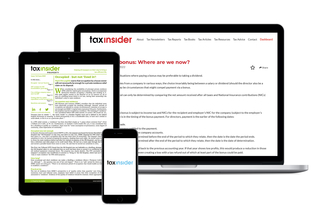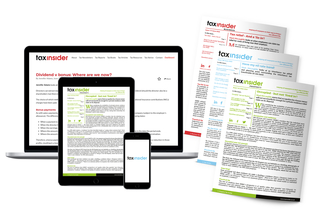New articles published
in July 2023
-
Possible alternatives to salary and dividends
Many in business will trade through the medium of a limited company and the directors will generally be remunerated by the payment of dividends or salary. The former are taxed on the recipient and must be paid out of profits subject to corporation tax, while the latter are subject to National Insurance contributions (NICs) as well as income tax.
Richard Curtis suggests possible alternatives to salary and dividends.
-
Personal car or company car?
Given the reliance on and impact of cars, special tax rules are in place to manage the environmental footprint of vehicles.
Moneeza Siddiqui compares the tax implications of a personal and company car when used in an individual’s employment.
-
VAT: Service charges on commercial property
It is common for leases between landlords and tenants to give details of what services the landlord shall provide and what the tenants shall pay for the upkeep of the building as a whole. The lease may provide for an inclusive rental, or it may require the tenants to contribute by means of an additional charge to the basic rent. These charges are generally referred to as service charges, maintenance charges or additional rent.
Andrew Needham looks at the VAT position of service charges on commercial property.
-
Important considerations when extracting profits from companies
Once a sole trader or partnership has incorporated, the owner or partners can no longer help themselves to the business’s profits at will; such individuals were previously subject to income tax and National Insurance contributions (NICs) based on those profits, irrespective of how much they took from the business.
Chris Thorpe looks at some considerations when extracting profits out of limited companies.
-
What’s in a name? Distributions in specie
I was asked a question recently about a transfer of shares between a 60% subsidiary to its holding company and whether this would be better structured as a dividend in specie or a distribution in specie. I was initially thrown by the question; surely, they are the same thing? Of course, from a corporation tax point of view, it makes little odds since what some of us still call ‘Schedule F’ income is exempted by (CTA 2009, s 931B).
Ken Moody highlights some confusion over what exactly are ‘distributions in specie’ and outlines some important tax implications.
-
Short-term Company loans for company owners
The cheapest personal bank loan rates are double what they were 18 months ago, though this has stabilised recently. Currently, the best loan interest rate between £7,000 and £25,000 is 5.9%.
Jennifer Adams explores where company owners might get useful short-term loans.
-
‘By reason of employment’ - its significance for tax purposes
The UK tax system is full of potential surprises. For example, it sometimes treats certain situations and events as having occurred, which did not necessarily happen in the ‘real’ world.
Mark McLaughlin looks at what ‘by reason of employment’ means and a Supreme Court decision highlighting its significance for tax purposes.
-
Q&As with Arthur Weller
Some of our most popular articles
-
Dividends or bonuses? We can work it out!
Consider the following scenario:
'On a wintry sunny morning, Alan was reviewing his company’s January 2024 management accounts. Alan was the sole director and 100% shareholder of Llandudno Hotels Ltd, which operated two large hotels in Llandudno. The business was on course to healthy pre-tax profit of around £650,000 for the year ended 31 March 2024. Alan had been planning to pay himself a substantial ‘bonus’ before the year-end'.
What does Alan do?
Peter Rayney examines an owner-manager’s cash extraction following the numerous tax and National Insurance contributions changes.
-
Use them or lose them: 2023/24 tax allowances
As the tax year draws to a close, it is prudent to review one’s 2023/24 tax allowances and consider whether there is scope for utilising any unused allowances so they are not lost.
Sarah Bradford explores options for using 2023/24 tax allowances so they are not wasted.
-
Record-keeping in a digital age
Lee Sharpe looks at taxpayers’ record-keeping obligations in light of HMRC’s inexorable march to digital everything (almost).
Historically, HMRC has been quite relaxed about whether original records must be maintained or digital facsimiles (scans, etc.).
-
Trap for business owners seeking CGT incorporation relief
HM Revenue and Customs (HMRC) recently commenced a ‘One to Many’ campaign, targeting taxpayers who incorporated property businesses in the tax year 2017/18 but reported no capital gains tax (CGT) liability in their tax returns on the basis that ‘incorporation relief’ applied in full.
Mark McLaughlin highlights a potential trap for business owners seeking capital gains tax incorporation relief.
-
Q&As with Arthur Weller
Subscription Benefits
We asked our subscribers what they love about Tax Insider Bundle.
These are the top 7 reasons that they gave us:
Monthly Newsletter
Tax Insider Bundle…





